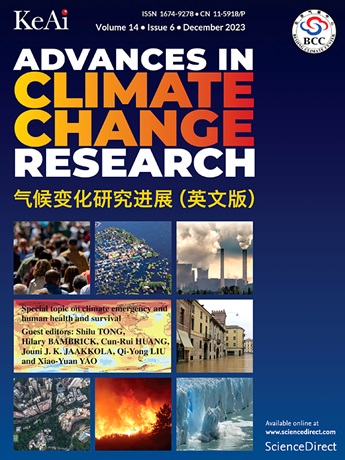确定多方行动者对极端天气事件健康风险的实际适应
IF 5.2
1区 地球科学
Q1 ENVIRONMENTAL SCIENCES
引用次数: 0
摘要
为了应对气候变化造成的极端天气带来的不断升级的健康风险,特别重要的是为各种行为者确定量身定制的适应措施,使他们能够迅速有效地作出反应。然而,各方应采取的具体和全面行动仍不明确。本研究首先建立了一个适应行动框架,描绘了实施适应措施的途径,包括综合监测、风险评估、风险预警、政策响应、有效性评估和能力建设。在这一框架内,该研究确定了适合政府、医疗机构、社区和个人等不同行为体的实际适应行动清单。这些行动包括建立多部门协调机制、开展健康风险评估、促进远程医疗、利用可穿戴保健设备等。此外,本研究回顾了适应与气候变化相关的健康风险的进展,揭示了国家和区域适应计划正在越来越多地得到实施,早期预警系统变得更加精确和信息丰富,适应知识共享举措正在不断发展和创新。然而,在部门间合作、认识差距和资金不足等领域仍然存在三大挑战。总的来说,这项研究为行为体制定和实施减轻气候变化带来的健康风险的综合战略提供了一条明确的途径。本文章由计算机程序翻译,如有差异,请以英文原文为准。
Identifying practical adaptations to health risks from extreme weather events for multi-actors
To address escalating health risk posed by extreme weather due to climate change, it’s particularly important to identify tailored adaptation measures for various actors, enabling them to respond quickly and effectively. However, there remains a lack of clarity on the specific and comprehensive actions each actor should take. This study first establishes an adaptation action framework to delineate a pathway for implementing adaptation measures, encompassing integrated monitoring, risk assessment, risk warning, policy response, effectiveness evaluation, and capacity building. Within this framework, the study identifies practical adaptation action lists tailored to various actors---governments, healthcare facilities, communities, and individuals. These actions include establishing multisectoral coordination mechanisms, conducting health risk assessments, promoting telemedicine, utilizing wearable health devices, and more. Furthermore, this study reviews the progress of adaptations to health risks associated with climate change, revealing that national and regional adaptation plans are increasingly being implemented, early warning systems are becoming more precise and informative, and adaptation knowledge-sharing initiatives are continuously evolving and innovating. However, three significant challenges persist in areas such as intersectoral collaboration, awareness gaps, and insufficient financing. Overall, this study provides a clear path for actors to develop and implementing comprehensive strategies to mitigate the health risks posed by climate change.
求助全文
通过发布文献求助,成功后即可免费获取论文全文。
去求助
来源期刊

Advances in Climate Change Research
Earth and Planetary Sciences-Atmospheric Science
CiteScore
9.80
自引率
4.10%
发文量
424
审稿时长
107 days
期刊介绍:
Advances in Climate Change Research publishes scientific research and analyses on climate change and the interactions of climate change with society. This journal encompasses basic science and economic, social, and policy research, including studies on mitigation and adaptation to climate change.
Advances in Climate Change Research attempts to promote research in climate change and provide an impetus for the application of research achievements in numerous aspects, such as socioeconomic sustainable development, responses to the adaptation and mitigation of climate change, diplomatic negotiations of climate and environment policies, and the protection and exploitation of natural resources.
 求助内容:
求助内容: 应助结果提醒方式:
应助结果提醒方式:


